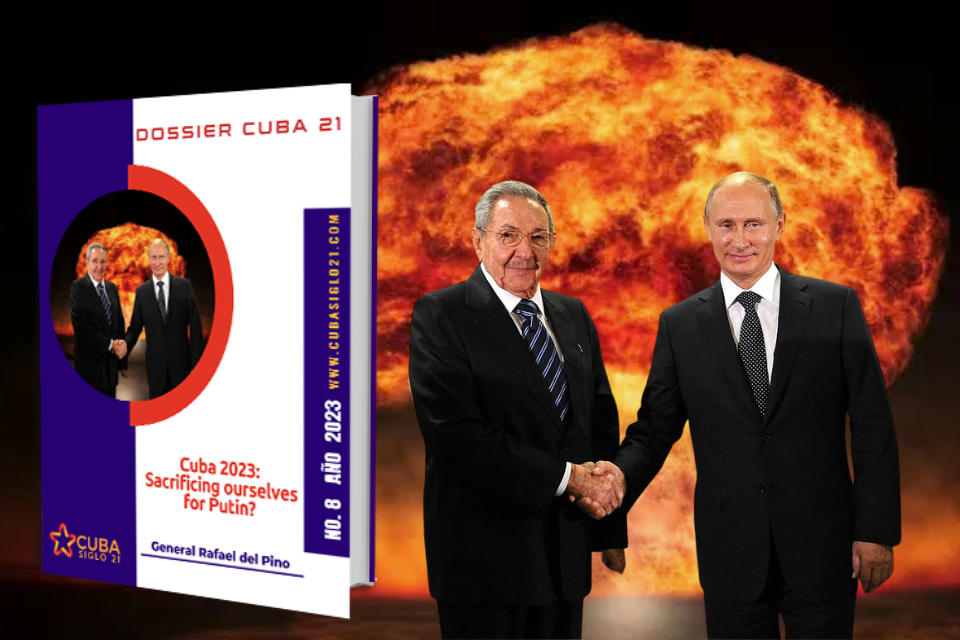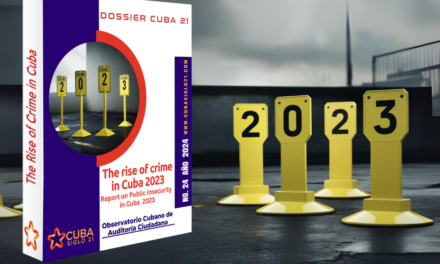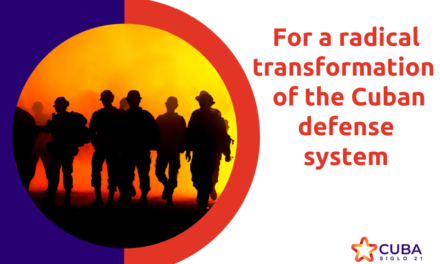Download entire Dossier No. 8 English
Descargar Dossier No. 8 Español completo
See original document Conversation of General Raúl Castro Ruz with comrades Yu. V. Andropov (Spanish)
Transcription English Conversation of General Raúl Castro with Yu. V. Andropov
In the conversation between Andropov and Raúl Castro, on December 29, 1982, the then leader of the USSR clearly stated that his country – the second world superpower at that time – would not get involved in the military defense of Cuba.
“We cannot fight in Cuba. Simply because you are 12,000 kilometers away from us […] To go there to get our faces smashed in? No!”, Yuri Andropov replied to Raúl Castro’s request that the USSR make public its unconditional support for Cuba in case of US aggression.
Andropov and Castro four decades ago also makes it possible to identify the probable real objectives behind actions such as the visit of the Baltic Fleet warship to Cuba and the growing calls to Putin by Kremlin-friendly media, institutions and “experts” to establish a significant military presence on the island.
First the USSR and then Russia have involved Cuba in high-risk activities convenient to their strategic interests, only to later unilaterally take the decision to leave the island’s security unprotected. At the center of his research is always the question of whether Cubans will once again run risks and pay sacrifices for such an unreliable ally, regardless of the repugnant nature of its current intentions.
There is a quantitative and a qualitative difference that Moscow intends to achieve on this occasion, with Khrushchev’s operation in 1962, which aimed to abruptly achieve nuclear parity with the US by acquiring the capacity to deliver a devastating first strike.
The idea of stabilizing a flow of visits by Russian nuclear-armed vessels is to enable Putin to engage in a credible nuclear blackmail. Putin, who has theatrically managed his role as an irrational actor to threaten Europe with the use of nuclear weapons if NATO does not cease its support for Ukraine, would now try to bring that and other demands to the U.S. by sitting on its doorstep as a sort of Bin Laden wearing a nuclear explosives suicide vest. That would not require the massive resource mobilization of 1962 but the continued presence in Cuba of at least one ship capable of launching a limited nuclear strike, but one that would cause intolerable damage.
SUMMARY OF DOSSIER No. 8 Cuba 2023: Sacrificing ourselves for Putin?
- The relaunching of Havana’s alliance with Moscow is not happening because there are no other options. The reason for opting again for Moscow, instead of a democratic and free market development, supported by the Cuban diaspora, Washington, and the European Union, is that the objective of the Cuban oligarchy is neither national development nor the prosperity of the population. This group wants to ensure how to stay in power, and they believe that a system that is centralized to the maximum extent possible and politically authoritarian, is the one that offers the most guarantees to that end. Putin’s mafia state suits their purposes even better than the market communist regimes of Vietnam and China.
- Moscow did not provide any substantive support to Cuba in recent years, until it saw the possibility of using the country once again -as General Del Pino explains- for its war purposes in Europe. Since February 2022, Cuba has been lending Moscow valuable support on the diplomatic front – United Nations, Group of 77 and CELAC, among others – and in propaganda in the Hispanic world. Cuba was an active and efficient part of the aggression against Ukraine from day one.
- The current arrival of Russian warships to Cuba and their reciprocal visits of high-level military personnel are part of a campaign of active measures to obtain concessions drawn along similar lines to the one Raul Castro requested from Andropov in 1982 when he saw the impossibility of securing more solid commitments. The fact that now, according to the Russian media, several institutions and experts close to Putin are publicly encouraging him to resume the Russian presence in Cuba, is only intended to legitimize the Russian president’s decision should he decide to do so.
- To make this threat credible, the logic put forward by Raúl Castro in 1982 of gradually “normalizing” the Russian military presence in Cuba could be applied.
However, in 2023 the means deployed by the Soviets in 1962 are not needed. Through Operation Anadir, between June 17 and October 22, 1962, the government of the Soviet Union sent to Cuba some 43,000 soldiers and officers with 36 ballistic missiles (MRBM of 1,770 kilometers range and 24 IRBM of 4,025 kilometers range, 36 ground-to-ground missiles and 32 Sopka cruise missiles, 6 IL 28 bomber planes with their corresponding six nuclear bombs and 164 nuclear warheads for the different types of missiles. With today’s technology such a deployment is not necessary for an active measures’ operation aimed in its first phase at limited political and economic gains.
At present, a submarine “on a friendly visit to the sister republic of Cuba” carrying Kalibr cruise rockets capable of flying at a height of only 50 meters and carrying conventional or thermonuclear warheads would be a credible threat if the one who controls such weaponry projects himself as an irrational actor, as Putin has been doing with his repeated nuclear threats to prevent NATO support for Ukraine.
Such an action, for example, would put the Turkey Point nuclear plant in Florida within minutes of the range of a Kalibr cruise missile launched from the naval base at Bay of Cabañas. That would not remotely balance the current military equation between Russia and Washington, but it would serve a political purpose by aggrandizing Putin within Russia (especially after the mercenary mutiny has shown him to be weak) and dividing the positions of the U.S. parties engaged in a major election cycle.
Nevertheless, what prevails in Washington is a paralysis justified by the supposedly little objective relevance of this challenge from a strictly military perspective, Russia could in the future maintain this flow of military visits (as Raul Castro suggested to Andropov in 1982) to boast of a pretended capacity to challenge the United States in its backyard and use this image in its propaganda. In politics, what is imposed as perception becomes real. If the countries of the region believe that the United States is a decadent power incapable of demanding certain standards of conduct from its enemies, it will be easier for the Kremlin and Havana to strengthen their influence in this part of the world.
It is necessary to distinguish the difference between the 1962 crisis and the scenario that could now be brewing in the Kremlin. In 1962, a Soviet statesman was looking for a way to balance the threat of his strategic nuclear force with that of his opponent with a single bold maneuver. In 2023 the head of the Kremlin might be tempted to play the role of an irrational Bin Laden sitting on the US doorstep, wearing a suicide vest with nuclear explosives to demand concessions for the benefit of Russia and Cuba. The vest is not enough to liquidate his opponent, but it is enough to inflict significant damage if he is not granted what he demands. And if he makes us believe that he is a crazed “irrational actor” and not an imposter trying to con us, he could get away with it.
Nuclear blackmail did not work in Europe except to slow down NATO arms deliveries to Ukraine, but Putin may think that in the polarized US election cycle it could work if he took on the role of a “terrorist on the verge of a nervous breakdown”. However, conspiring against the idea that he would succeed in presenting himself as a dangerous “irrational actor” is the hesitation and timidity with which he acted in the face of the recent mutiny by Wagner Corporation mercenaries. - Cuba has chosen to be a belligerent country on the side of the aggressor in a European war, where Putin has been declared a war criminal and against whom the International Criminal Court in The Hague has issued an arrest warrant. This changes the context in which certain activities of influence were carried out in the past by persons sympathetic to the Cuban regime within the United States and were perceived as “normal”; from now on they shall be perceived and treated with the severity applied to an enemy activity in times of war.
- In this new scenario in which Cuba has become a close ally of the aggressor of Ukraine, the shared electronic espionage activities (SIGINT) developed by Cuba with Russian support for many years, now constitute an act of war, insofar as Russian troops in Ukraine can immediately operationalize the information obtained for their benefit and cause the death of thousands of Ukrainians. As mentioned above, the presence of such capabilities in Cuba would also serve Putin after the weaknesses projected during the Wagner mutiny to reinforce the perception that he is a “tough guy”. If the West swallows that myth, he will be able to strengthen his negotiating position by offering an eventual Russia’s withdrawal from Ukraine in exchange for a commitment not to allow future NATO membership of that country.
Given the expectations induced by the Cuban official propaganda apparatus that the alliance with Russia will improve domestic consumption, we ask ourselves: Will the steps that the Cuban oligarchy has been taking together with Putin strengthen Cuban society – its economy, national security and internal governance – or will they make it even more precarious?
To the question “where are they taking us”, we do not hesitate to answer, together with General Rafael del Pino, that they are dragging us rapidly towards a catastrophe.
Download entire Dossier No. 8 English
Descargar Dossier No. 8 Español completo
See original document Conversation of General Raúl Castro Ruz with comrades Yu. V. Andropov (Spanish)
Transcription English Conversation of General Raúl Castro with Yu. V. Andropov







